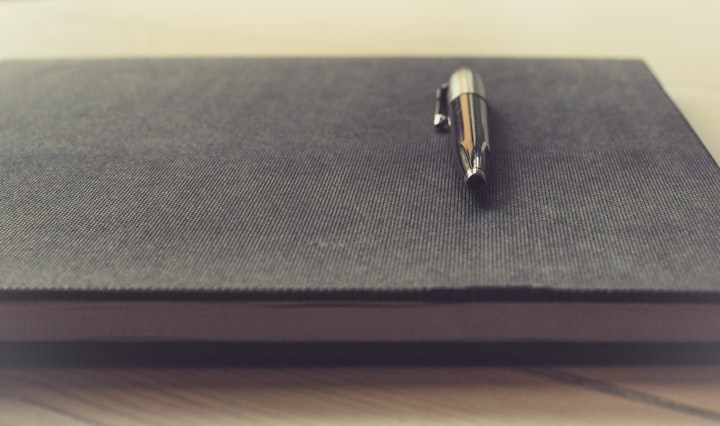Why I Won’t Read a Book on Writing
or really listen to people give their advice on writing unless it’s like a script writer talking about what to include in scripts because I always forget

I know, I know “who am I to not listen to Stephen King, Neil Gaiman, or you (the person who probably wrote tons of articles on writing).” You know what, I’m Jay. And I have my reasons.
Just hear me out. ’Cause it’s not like I think I’m the greatest writer, or they know nothing. I just think…
1. They’re all pretty much gonna say the same thing
Their process is typically the same. Either they wake up early and knock out 30 pages or they go for a walk to clear their head, then get to writing. Sometimes it takes rewrites of the same paragraph, maybe they chill and let it hit them…but regardless, it comes down to the same thing which is…
2. They just write
No matter what you read… it won’t make you start writing. You have to put the pen to paper. You have to actually try. No one can tell you what’ll inspire you, or when you’ll write something good. The author already wrote. You have to write now.
They don’t know you or what works for you, but they do know that only when you write…you create. You can’t get around that.
3. I think reading random books in your genre is more helpful than reading a book on writing
All they can do is tell you what they did to get their work done, and that they…wrote.
Reading a book in your genre for your targeted audience will tell you what you like, what you don’t like, what works for others (see how well it performed), and what inspires you. I’ve picked up books in different genres and I’ve been like hmm I’d like to switch up this storyline. Maybe I’ll do what they did and include some photos or not have any quotation marks when my characters speak.
Helpful tip: copy someone else, but change it of course. Every story is a copy, just take something and make it your own (not in a plagiarizing way pleaseeee) (I do not sign off on that idea). Read a poem, take something away from it and create something new. I did this when I read “Hills Like White Elephants” for an assignment (I don’t know why I was in a writing class, I should make a post about why I left. But, this was a great assignment).
4. There are no set rules for writing and I stand on that
I think you can play around with formatting and how you want your pages to look. A mystery book not told in order (Cain’s Jawbone), a book with black paper (some poetry book I saw), or no quotation marks (Speak No Evil).
They tell you to not do this or that, but you surely can if you want! There’s an audience for everything and one shouldn’t limit themselves just because someone else advises they should. Show, tell, use metaphors and descriptions. Do what you gotta do for you, and know others will like it. I’ve read plenty things I didn’t think I’d like at first, but ended up loving. They really took me outta my reading comfort zone.
Poems are whatever you say they are (I’ll be honest, it took me a bit to accept a grocery list as a poem), and so are books (lengths do vary for certain genres). But, all in all you can play around with it.
Say what you want to say however you wanna say it.
5. They don’t need to be full books or long speeches that repeat the same idea
You can summarize them in 3 sentences: You should write every day or when you can. You must write for yourself. Actually…just write.
And maybe a corny (but truthful because people are afraid of failing or even succeeding!) line about not holding yourself back and being willing to fail because not everything you create will turn out to be a masterpiece.
6. I don’t really need the help.
I have the creativity. I write when I wanna, or when I have to. I sometimes don’t because I don’t wanna. Sometimes I force myself when I don’t want to just to do something. So, I guess I don’t read ’em because I can’t see them inspiring me or see them being helpful.
They can’t really tell you anything you don’t know. You know to write. You know that either you work best when you sit and force yourself to do it or dialogue comes to you when you take showers.
Note: of course books by authors on writing may include anecdotes that ties in ow they can up with their story idea. Those are interesting if you like the author and their work and you’re like “huh, wonder how they came up with that.”
If it inspires or helps you then GO AHEAD. I’m not here to crap on what you love. I just want you to write!
Thanks for reading. Peace.
About the Creator
Jay,when I write
Hello.
What?
23, Black, queer, yup
Reader insights
Nice work
Very well written. Keep up the good work!
Top insights
On-point and relevant
Writing reflected the title & theme
Easy to read and follow
Well-structured & engaging content
Heartfelt and relatable
The story invoked strong personal emotions







Comments (11)
I did a CPD in writing because I was curious. I got some methods from it, but I've been writing since a young age. I follow no rules, never stick to one niche or traditional storylines, and I play with characters and break traditions. I know no boundaries, I simply write!
ugh, I'll admit, I was curious of your opinions here until I saw the words: "Every story is a copy, just take something and make it your own (not in a plagiarizing way pleaseeee) (I do not sign off on that idea)" And here's why: NOT EVERY STORY IS A COPY. When written stories first began to take form, the idea and concept of something like a disease that travels memetically was a concept that didn't exist. THAT means, someone was the first to propose the idea, the first to write a story on it, THE FIRST to create it. It thus cannot be a copy. This kind of mindset of: "every story is a copy" is WHY we have so many stories that are reversions, remakes, retellings, it's boring and unoriginal. There are original ideas out there waiting to be put down, waiting to be written for the FIRST time, not as a cheap copy. I agree with reading other books in your genre, but NOT with the mentality of "i'm going to copy this idea and alter it slightly just so it's not plagiarism." writing is a craft, like weaponsmithing, blacksmithing, pottery making, etc. It's a skill that anybody can pick up, you train under a master of the craft and pick up their teachings and their skills until you're able to find your own style, your own unique mark, and then you become a master of your craft and sell your own product. This is true in blacksmithing, and it's true in writing as well, the "master" you train under is the authors of the books in your genre. Just like a roaming weaponsmith would look at the craftmanship of other swords and weapons, judging them for their quality and asking questions of the creator, so too do we as authors do this, by reading the works of others. As far as the concept that every story is a copy of another, I'm sorry, but you are just plainly wrong.
I have seen that two of my favorite authors have diametrically opposed views on this subject. As stated by yourself, Stephen King espouses the thought that taking creative writing courses and classes on how to write is the way to go. Dean Koontz, who writes in the same basic genre says, if you want to be a writer, pick up a pen and write. As can be seen from your post, you adhere to the Koontz philosophy. So do I. I read, voraciously, and write on my own. For me, it works.
https://vocal.media/fiction/challenging-the-king-on-writing
I think that this is great advice, myself being someone who actually enjoys "on writing" books, lectures on writing advice, etc. I think like you said above, reading books in your genre is much more helpful and intuitive. I have learned so much more about writing fantasy stories by just reading Brandon Sanderson's books than watching his lectures. Much love to you dude, and well written article to boot. :D
thank you for sharing !!
Good advice for many endeavors. If you want to be a chef, taste as many foods as possible so you can create your own dish from the ingredients you gain from each one. It is the same with writing - if you are going to write stories, then read stories. All kinds. Evaluate what speaks to you and incorporate your experiences into your unique ideas. The only real reason to read about the subject of writing is if you are trying to mold your story into what the majority of readers are looking for in a story so you can sell it. If your motivation is to just write what is pounding in your brain, just sit down and write. Good piece, thanks!
Spectacular article. I especially liked when you said the best way to learn to write well is to read good books.
I agree. I also agree with Stephanie Hoogstad, in that books work for some people, they don't for others. I don't read a lot of writing books, almost none in fact. Stephen King's "On Writing" for me told me nothing about writing that I didn't already know. That stuff I could skim, and I did. The great stuff in the book was the stories of his life. I find that writing books can be a trap. You've said essentially the same thing that Hemingway said in one of my favorite quotes. His guide to writing is, "Put paper in typewriter. Put ass in chair. Write." If you're going to do it, do it. But way too many writers don't actually write, they read about writing, they talk about writing, they talk about reading about writing, and they talk about reading, and it's all very boring. They don't write, and when they do, that shit is pretty boring, too. If you want to write, you read, you learn from what you read, and you write.
Fair points! We all have to figure it out on our own.
Thank you for the article. While an interesting take, I’ve actually heard these points before. Doesn’t mean that they shouldn’t be made; it’s just clear that books on writing don’t work for everyone. Funny enough, reading in one’s genre is actually something that I have come across while reading other writers’ advice (although I will admit that it wasn’t a book on writing, just random quotes). I do agree that writing books say the same or similar things, although there’s usually the author’s own twist on it (which I will, perhaps controversially, say is all that there is to writing itself, the same basic stories and messages with the writers’ twist on them). There are actually rules to writing or at least traditions in writing, but the reason writers learn them is so that they can then break the right ones when appropriate. That’s where some of the true genius, in my opinion, comes in; writers don’t ignore the rules but learn them and then artistically break them in a way that highlights other aspects of their writing. Obviously, just like you should read books on writing if they help you, so should you not read books on writing if they don’t work for you. Like you said, only the writer knows what works for them.